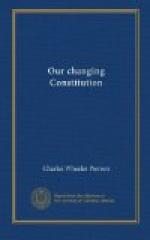I profoundly regret that in a case of this magnitude, affecting as it does an amendment to the Constitution dealing with the powers and duties of the national and state governments, and intimately concerning the welfare of the whole people, the court has deemed it proper to state only ultimate conclusions without an exposition of the reasoning by which they have been reached.
and proceeded to announce the reasons which had actuated him personally. Justice McKenna said:[3]
The court declares conclusions only, without giving any reasons for them. The instance may be wise—establishing a precedent now, hereafter wisely to be imitated. It will undoubtedly decrease the literature of the court if it does not increase lucidity.
[Footnote 1: Id., p. 386.]
[Footnote 2: Id., p. 388.]
[Footnote 3: 253 U.S., p. 393.]
Perhaps a hint as to the reasons actuating the majority of the Court may be found in the brief concurring memorandum of Mr. Justice McReynolds. He said:[1]
I do not dissent from the disposition of these causes as ordered by the Court, but confine my concurrence to that. It is impossible now to say with fair certainty what construction should be given to the Eighteenth Amendment. Because of the bewilderment which it creates, a multitude of questions will inevitably arise and demand solution here. In the circumstances, I prefer to remain free to consider these questions when they arrive.
[Footnote 1: Id., p. 392.]
Justices McKenna and Clarke dissented from portions of the decision dealing with the question of the proper construction of the grant of “concurrent power” to Congress and the States, and wrote opinions setting forth the grounds of their dissent. Both Justices, however, concurred in affirming the validity of the amendment.
Thus the legal battle was fought and lost. The amendment had withstood attack and men’s minds settled back to the practical question of its enforcement.
Upon that question, however difficult and interesting, we do not here enter. Our present concern is to ascertain as nearly as may be the true place of the amendment in the development of American constitutional law.
That it affords startling evidence of a radical departure from the views of the founders of the Republic is beyond question. Such a blow at the prerogatives of the states, such a step toward centralization, would have been thought impossible by the men of 1787. It would be a mistake, however, to view the departure as having originated with this amendment. Rather is the amendment to be regarded as merely a spectacular manifestation of a change which was already well under way.




